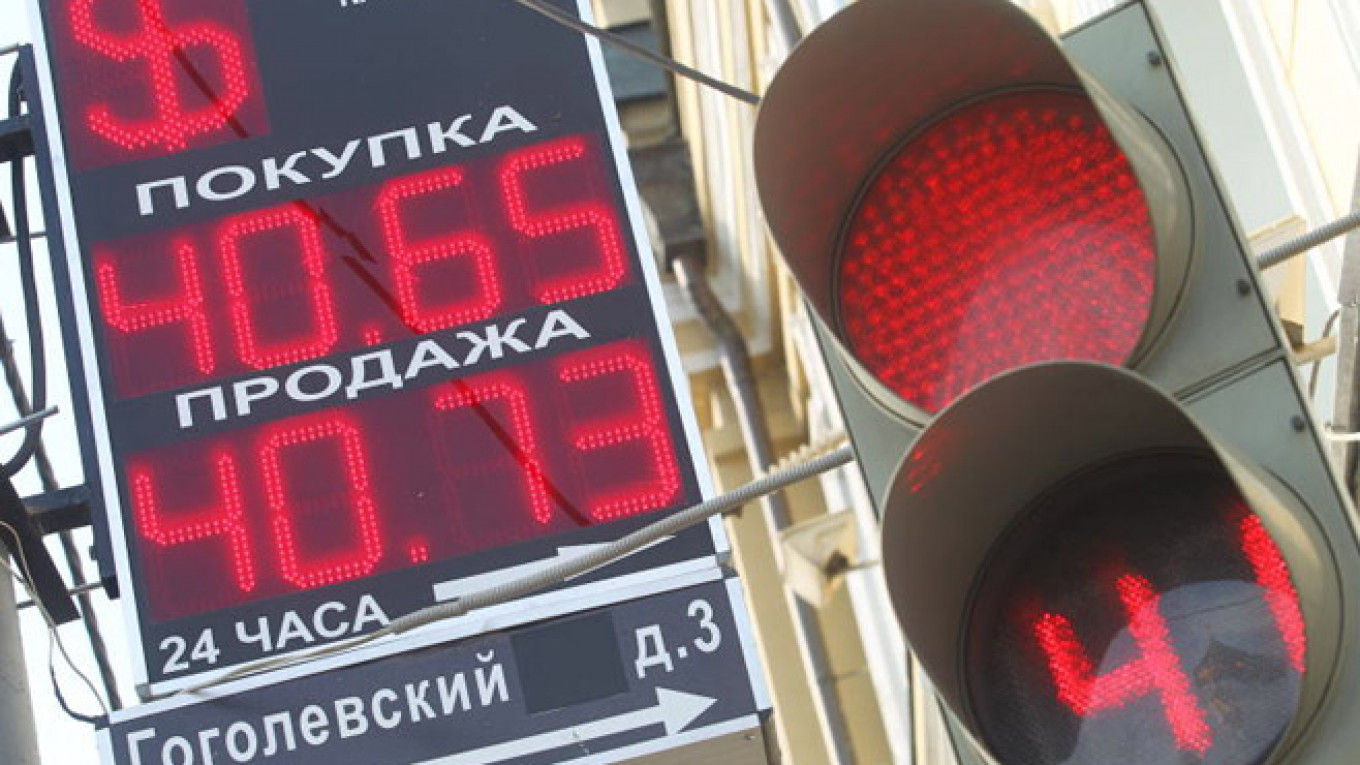The exchange rate for the Russian currency recently dropped to 41 rubles to the dollar, with no change in that trend expected. And although the weakening of the ruble might stem in part from a stronger dollar that forced down the Japanese yen by 7.6 percent, the euro by 8.1 percent and the Brazilian real by 11.5 percent, the ruble dropped by close to 20 percent — a record decline among all major currencies.
This time will not be another 1998, when the sharp drop in the ruble's value led to growth.
And whereas Europe, Japan and South America might welcome a weaker currency as a means to higher exports, that rule does not hold true in Russia, where the population is in a near panic over the devaluation.
Can a "controlled devaluation" help restart Russia's economic growth? In my opinion, it cannot, and for two reasons.
First, devaluation is generally beneficial for industrialized economies that either supply the global market with a wide range of products, or else hope to enhance the competitiveness of their products on the domestic market. But in Russia, nonmilitary end-use industrial products account for only 4 percent of exports, and 45 percent of imports consist of goods not produced in this country at all.
For example, Russia has no manufacturers of computers, mobile phones and other forms of home electronics. That means Russian firms and consumers buying foreign equipment and technology in an effort to keep pace with progress will have to pay more for those products. Although the sharp drop in the ruble's value in 1998 opened the way for 10 years of continuous growth in the Russian economy, there is no reason to expect a repeat of that phenomenon this time.
Second, in most countries that welcome a devaluation of their national currencies, both the government and the private sector borrow in their own currency — and not in a foreign currency. As a result, devaluation actually provides them with new opportunities without increasing their overall debt burden.
In Russia, the Central Bank held back the growth of the money supply for many years, so that large companies obtained more credit abroad than in Russia. That growth in foreign liabilities was one of Russia's major sources of economic growth, and the factor least appreciated or understood by the public.
Russian corporations now owe about 18 trillion rubles ($450 billion) to domestic banks, but more than $580 billion to foreign banks ($131 billion of which is owed to Russian banks that in turn owe money to foreign financial institutions). That means any devaluation of the ruble only increases the debt burden of the real sector. In fact, the ruble's recent fall increased that burden by 4.4 trillion rubles ($109 billion), a sum that represents more than 65 percent of all profits earned last year by Russia's non-financial businesses.
Even Russia's raw material sector suffers from devaluation. Their budgets are pegged to the dollar and foreign-made equipment needed for development comprises a major part of their expenses: Rosneft and Gazprom spend only 4.5 percent and 7.5 percent of their budgets on salaries — a ruble expense.
The state is the only beneficiary of devaluation. For each 1-ruble increase in the exchange rate with the dollar, state coffers swell by up to 205 billion rubles ($5.1 billion) — or up to 1.55 percent of all annual revenues. That might create the impression that devaluation is the simplest way to eliminate budget deficits and compensate for nominal state spending cuts.
However, in a country where imports play a critical role in practically every sector of the economy, the rising cost of foreign currencies will give an upward push to inflation — expected to reach 12 percent or higher next year. That, in turn, will force the government to index pensions and salaries and ultimately eliminate any gains from the unexpected windfall.
Experience shows that devaluations do not inflict excessive economic damage if three conditions are present. First, the devaluation should come unexpectedly so that businesses and citizens do not adjust their financial plans for the long-term consequences. Second, devaluation should not exceed 10 percent to 25 percent so as not to provoke a strong inflationary effect. And finally, the Central Bank should keep rates low in order to show that nothing terrible has happened.
The difference between "good" and "bad" devaluations is obvious. In February 2014, Kazakhstan implemented a one-time and unexpected devaluation of its currency by 21 percent while maintaining the National Bank's discount rate at 5.5 percent. The result: steady economic growth and inflation expected to remain at the tolerable rate of just 7.5 percent through the year's end.
By contrast, in January 2011, Minsk began an incremental process to reduce the value of the Belarussian ruble, weakening it by 62 percent. The result: end-of-the-year inflation at 108 percent and a National Bank rate rising from 12 percent to 45 percent per year.
Russia has already missed its chance to emulate Kazakhstan: The ruble spontaneously depreciated this summer as much as the Kazakh tenge did in February under controlled conditions, the Central Bank is pushing rates upward, and inflation is growing monthly. Therefore, if it continues to follow the course set by President Vladimir Putin, Russia will eventually lapse into a "Belarussian scenario."
The Russian economy functions best when it follows a reverse logic: Moscow must strengthen, not weaken the ruble. That will reduce the price of industrial imports needed for modernization, simplify the repayment of Western loans, dampen inflation and ultimately enable the Central Bank to start lending to the economy on acceptable terms.
How to accomplish that is another question, but one that leaders, if they considered the matter more closely, could easily resolve.
Vladislav Inozemtsev is a professor of economics at the Higher School of Economics and director of the Moscow-based Center for Post-Industrial Studies.
A Message from The Moscow Times:
Dear readers,
We are facing unprecedented challenges. Russia's Prosecutor General's Office has designated The Moscow Times as an "undesirable" organization, criminalizing our work and putting our staff at risk of prosecution. This follows our earlier unjust labeling as a "foreign agent."
These actions are direct attempts to silence independent journalism in Russia. The authorities claim our work "discredits the decisions of the Russian leadership." We see things differently: we strive to provide accurate, unbiased reporting on Russia.
We, the journalists of The Moscow Times, refuse to be silenced. But to continue our work, we need your help.
Your support, no matter how small, makes a world of difference. If you can, please support us monthly starting from just $2. It's quick to set up, and every contribution makes a significant impact.
By supporting The Moscow Times, you're defending open, independent journalism in the face of repression. Thank you for standing with us.
Remind me later.








